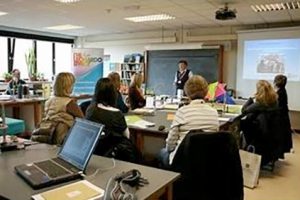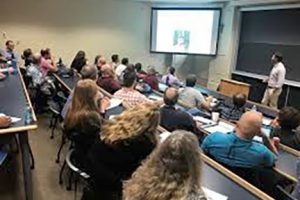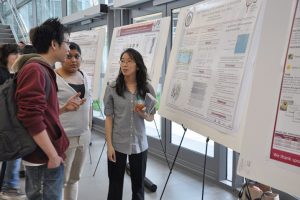Workshops, Symposia and Poster Sessions
BCCE Workshops
 Workshops have a specific, action-oriented purpose and aim to generate some concrete answers to current problems in the field, provide participants with hands-on experience with scientific equipment or technology, model a pedagogy, or help the participants develop a lesson. Workshops are a good opportunity to learn new skills and to familiarize yourself with a topic you don't know well. Advanced workshops help participants gain additional knowledge and skills in an area they are developing expertise. Workshops have a single facilitator or co-facilitators. Workshop facilitators are experts in the workshop topic.
Workshops have a specific, action-oriented purpose and aim to generate some concrete answers to current problems in the field, provide participants with hands-on experience with scientific equipment or technology, model a pedagogy, or help the participants develop a lesson. Workshops are a good opportunity to learn new skills and to familiarize yourself with a topic you don't know well. Advanced workshops help participants gain additional knowledge and skills in an area they are developing expertise. Workshops have a single facilitator or co-facilitators. Workshop facilitators are experts in the workshop topic.
Workshops at the BCCEs must be 75% active learning. Participants should be engaged with hands-on activities and group discussions. BCCE workshops promote interactions between participants. Often in a workshop, participants build something, measure something, manipulate materials and models to construct their own lessons, do an improved version of a laboratory experiment, or learn and practice a new pedagogy. BCCE workshops are either 3 hours (half day) 8am to 11am, 3 hours (half day) 2pm to 5pm or 6 hours (full day) 8am to 11am and 2pm to 5pm. Two-hour workshops are possible. Symposia sessions and workshop sessions run concurrently in the morning and afternoon.
BCCE Symposia
 Each BCCE symposium focuses on one particular issue or theme. A number of experts will come together in order to present their ideas, scholarship and research, providing oral presentations using the lecture format, supported by text, images, graphs, literature citations and equations on PowerPoint or Keynote presentation software. The authors and co-authors goal is to share and receive relevant information to an audience and to the other experts giving presentations about their project or research. Talks presented at the BCCE may be a precursor of a manuscript just starting or nearing completion for submission to a professional journal, such as the Journal of Chemical Education or Chemical Education Research & Practice. Symposia, by their nature, are formal events at National and Regional American Chemical Society meetings with a formal dress code for speakers. Symposia at the BCCE are less formal compared to National ACS meetings. The dress code for symposium presenters at the BCCE is business casual. Symposia presentations, generally, are didactic and only infrequently will include a hands-on component or a discussion. Each speaker is allocated 4 minutes at the end of their talk to answer questions from the audience, moderated by the presider. A symposium typically is either a half day session (6 to 8 speakers) or a full single day session (9 to 12 speakers). Some symposia end with a panel discussion with the speakers answering questions from the audience or from the presider.
Each BCCE symposium focuses on one particular issue or theme. A number of experts will come together in order to present their ideas, scholarship and research, providing oral presentations using the lecture format, supported by text, images, graphs, literature citations and equations on PowerPoint or Keynote presentation software. The authors and co-authors goal is to share and receive relevant information to an audience and to the other experts giving presentations about their project or research. Talks presented at the BCCE may be a precursor of a manuscript just starting or nearing completion for submission to a professional journal, such as the Journal of Chemical Education or Chemical Education Research & Practice. Symposia, by their nature, are formal events at National and Regional American Chemical Society meetings with a formal dress code for speakers. Symposia at the BCCE are less formal compared to National ACS meetings. The dress code for symposium presenters at the BCCE is business casual. Symposia presentations, generally, are didactic and only infrequently will include a hands-on component or a discussion. Each speaker is allocated 4 minutes at the end of their talk to answer questions from the audience, moderated by the presider. A symposium typically is either a half day session (6 to 8 speakers) or a full single day session (9 to 12 speakers). Some symposia end with a panel discussion with the speakers answering questions from the audience or from the presider.
The main difference between a symposium and a workshop is that a symposium has a symposium organizer who recruits people to submit abstracts or accepts abstracts for presentations of 15 minute talks. Each talk is on a different topic, but all presentations are grouped within the theme of the symposium. A symposium presider introduces the speakers and ensures the presentations start and end on time. Workshops focus on a single topic and there is sufficient time for the participants to experience the workshop theme, go into detail and have discussions. Workshop participants gain some expertise in the theme of the workshop. The atmosphere of a workshop is less formal than a symposium. Symposia sessions and workshop sessions run concurrently in the morning and afternoon.
BCCE Poster Sessions
Monday Session 1 and Tuesday Session 2: 5pm to 7pm
 A “Poster Session” is a way of providing an opportunity for chemistry educators to report and share their findings of projects or achievements in an informal setting. Poster presenters (authors) describe, explain and justify their research or project using large, detailed posters. The poster sessions allow the author to communicate their message using images, graphs, charts and data tables. The motivation for the project, data and conclusions are also presented. Posters can be an announcement of a new project, early results of a project, or a summary of the major findings of a project. Conference attendees walk by and around the posters, glance at posters titles and visuals, decide which posters to spend time learning more information about, and socialize. The poster presenters stand by their posters, deliver a short (2 minute) informal talk with anyone interested in the details of the project. There usually is an exchange of information where educators ask questions and the authors provide answers. As conference participants come and go, the author of the poster may present his or her talk several times during the session.
A “Poster Session” is a way of providing an opportunity for chemistry educators to report and share their findings of projects or achievements in an informal setting. Poster presenters (authors) describe, explain and justify their research or project using large, detailed posters. The poster sessions allow the author to communicate their message using images, graphs, charts and data tables. The motivation for the project, data and conclusions are also presented. Posters can be an announcement of a new project, early results of a project, or a summary of the major findings of a project. Conference attendees walk by and around the posters, glance at posters titles and visuals, decide which posters to spend time learning more information about, and socialize. The poster presenters stand by their posters, deliver a short (2 minute) informal talk with anyone interested in the details of the project. There usually is an exchange of information where educators ask questions and the authors provide answers. As conference participants come and go, the author of the poster may present his or her talk several times during the session.
The 26th BCCE poster sessions are held in the hallways of the Alumni Center, the same building being used by the exhibits, and in The LaSells Stewart Center. Participants are encouraged to attend both the posters and the exhibits. BCCE poster sessions have a two hour time frame. There will be adult beverages and light snacks available during the poster session for BCCE conference participants and for the poster presenters.